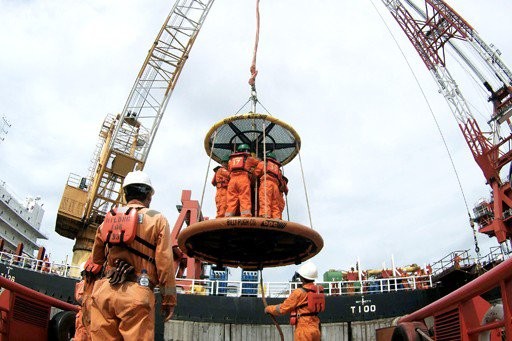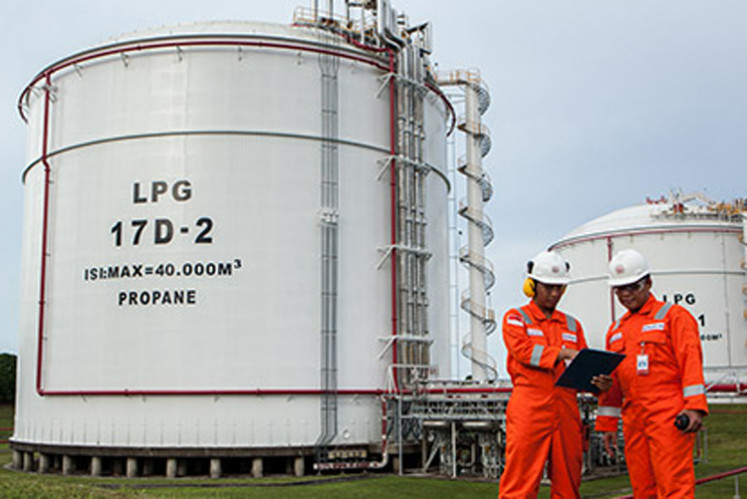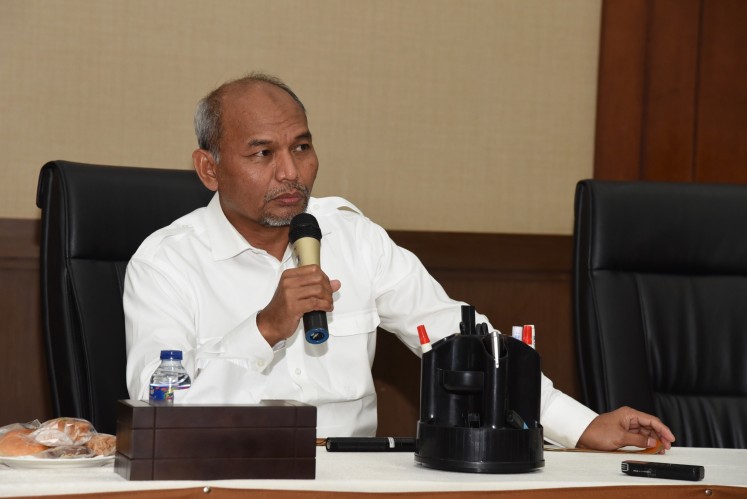Popular Reads
Top Results
Can't find what you're looking for?
View all search resultsPopular Reads
Top Results
Can't find what you're looking for?
View all search resultsNearly decade old oil and gas bill still moving at snail's pace
Change text size
Gift Premium Articles
to Anyone
A
bill on oil and gas has been nearly a decade in the hands of the House of Representatives, but there has been no significant progress on its deliberation. While the terms of the current President and lawmakers are nearly coming to an end, they are still trying to resolve their differences about the bill.
In fact, many lawmakers and the government believe that Law No. 22/2001 on oil and gas is already out of date, and therefore needs a revision.
The bill has been on the deliberation list of the National Legislation Program since 2010. The latest progress shows that the ball is back in the government's court as it is still in the process of finalizing the problem inventory list (DIM).
A natural resources law expert at Tarumanagara University, Ahmad Redi, does not consider it likely that the deliberation will be completed before the legislative and presidential elections in April.
“I’m doubtful they can finish the deliberation this year because of the elections in April. Lawmakers will be very busy campaigning in their constituencies,” he told The Jakarta Post on Tuesday.
He blamed lawmakers for a lack of willingness to complete the bill, although they knew that because of the absence of an updated law, certain issues could not be resolved, including the establishment of a permanent institution that would be authorized to manage the sector.
A key example was the dissolution of upstream oil and gas regulator BP Migas by the Constitutional Court in 2012, which was replaced by the Upstream Oil and Gas Regulatory Special Task Force (SKK Migas).
“The wish to complete the bill deliberation is nonexistent [among lawmakers] although the Constitutional Court decided to dissolve BP Migas,” he said, adding that the new law was needed to become a legal basis for reestablishing such an institution.
Workers at the Badak liquefied natural gas plant in Bontang, East Kalimantan. (Courtesy of/badaklng.co.id)The ruling on the establishment of such an institution has long been a burning issue in the deliberation of the bill between the government representatives and lawmakers and it may be the major barrier to completing the bill's deliberation.
In 2017, the debate focused on whether the SKK Migas would become a state-owned enterprise (SOE) or be merged with state-owned oil and gas company Pertamina. There was also an idea to establish an oil and gas special body (BUK Migas), a kind of a holding company to handle the oil and gas business.
A lawmaker of House Commission VII, which oversees the energy sector, who is a member of the opposition Gerindra party, Ramson Siagian, blamed the government for the sluggish deliberation progress. “Since 2010, we have discussed this with the government, but they [government representatives] have given us a slow response,” he said.
House legislation body (Baleg) chairman Supratman Andi Agtas had a more optimistic outlook, saying he had hope the bill could be finished this year as currently the government was in the process of finalizing the DIM.
After the DIM is finished by the government and approved by President Joko “Jokowi” Widodo, it will be discussed by members of Commission VII and government representatives, he added.
Oil and Gas director general Djoko Siswanto. (Courtesy of/The Energy and Mineral Resources Ministry)Energy and Mineral Resources Ministry oil and gas director general Djoko Siswanto confirmed Supratman’s statement, saying that the government had discussed the DIM internally, involving the Downstream Oil and Gas Regulatory Agency (BPH Migas) and SKK Migas.
“We will submit the DIM to the state secretariat and aim to send it to the House of Representatives next month,” he said.
When asked about the crucial issues in the DIM, Djoko only mentioned the new special business entity on oil and gas (BUK Migas), which might replace both BPH Migas and SKK Migas. He said the government focused on the recommendation made by the Constitutional Court to create a state-owned enterprise to manage the oil and gas business.
In September, the Post obtained an oil and gas bill from the House’s working committee for the bill (Panja RUU Migas), which includes a ruling that BUK Migas will work directly under the President’s supervision.
Under the bill, BUK Migas will also have a role to audit the development plan of oil and gas working areas, sign all partnership contracts; assess private contractors that plan to invest in the sector and be responsible for national oil and gas reserves. (bbn)












